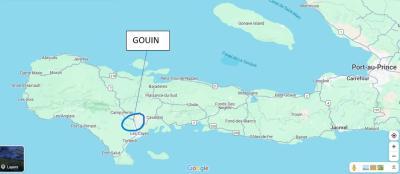
The liberation of our continent means more than overcoming economic, social, and political dependence. It means, in a deeper sense, to see the becoming of humankind as a process of human emancipation in history. It is to see humanity in search of a qualitatively different society in which it will be free from all servitude, in which it will be the artisan of its own destiny. It is to seek the building up of a new humanity… Gustavo Gutierrez
Quixote Center is thrilled to announce new work in Haiti! In the planning for more than a year, the Gouin project is finally ready to launch.
Gouin is a rural village in the commune (county) of Laborde, near the city of Les Cayes and in the South, where there is no current gang activity. The total population of the community and surrounding areas is 11,000. This project will reach 100 rural families, or approximately 500 to 1000 people. The project is a pilot, designed to be scalable and replicable.
Based on a community study conducted in 2023, the objective of the project is to provide targeted investments, suggested by the community, so that participating families improve income and food security enough to eliminate their dependence on outside assistance and are thus on a path to become artisans of their own destiny.
There will be four types of investments:
- Agriculture. Participants will increase land under cultivation and diversify crops.
- Livestock. Participants will improve breeding and veterinary care to increase their livestock holdings.
- Commerce. Participants will have access to small and medium loans to increase the income of their small businesses and start new businesses. This part of the program reaches primarily women and is designed to improve their financial autonomy.
- Training. Participants will receive training on sustainable, climate-friendly agricultural techniques, as well as gender equity and managing finances.
What sets this program apart from other agricultural investments is the monitoring and measuring for success. After doing a baseline study, success indicators will include:
- Increase in household income, looking for at least 20%;
- Increase in children in school, looking for at least 60%;
- Improved crop yields, looking for a harvest of at least 60% of crops planted;
- Increased land under cultivation, looking for a minimum of 5 hectares per family;
- Improved trade diversification among women measured in expansion and income.
The project will also include activities for children to sensitize them on the importance of conservation.
Although this is optimistic given the situation in Haiti, we hope to be able to publish the first indicators within a year. We will look at what is working well and adjust anything that is not working well, and then add new participants.
Small-scale farmers, defined as farming two hectares or less, produce about 35% of the world’s food supply. When the number of hectares goes up to 10, they produce nearly 80% of the world’s food. Approximately 80% of the global population living under the poverty line of $2.15 per day is rural and subsisting on small-scale farming. Globally, we depend on small-scale farmers for our food supply, yet they can’t make a living.
In addition to producing our food, small-scale farming is part of a climate solution. They tend to produce a wide variety of crops on small plots of land, which protects biodiversity. They are less likely to use or have access to machinery that pollutes, and have limited access to chemical fertilizers and pest control.
Quixote Center is partnering with DCCH, Christian Community Development in Haiti, a part of the Caritas network, to implement this project. Each of you, our donors and supporters, is also a partner in this work. We look forward


